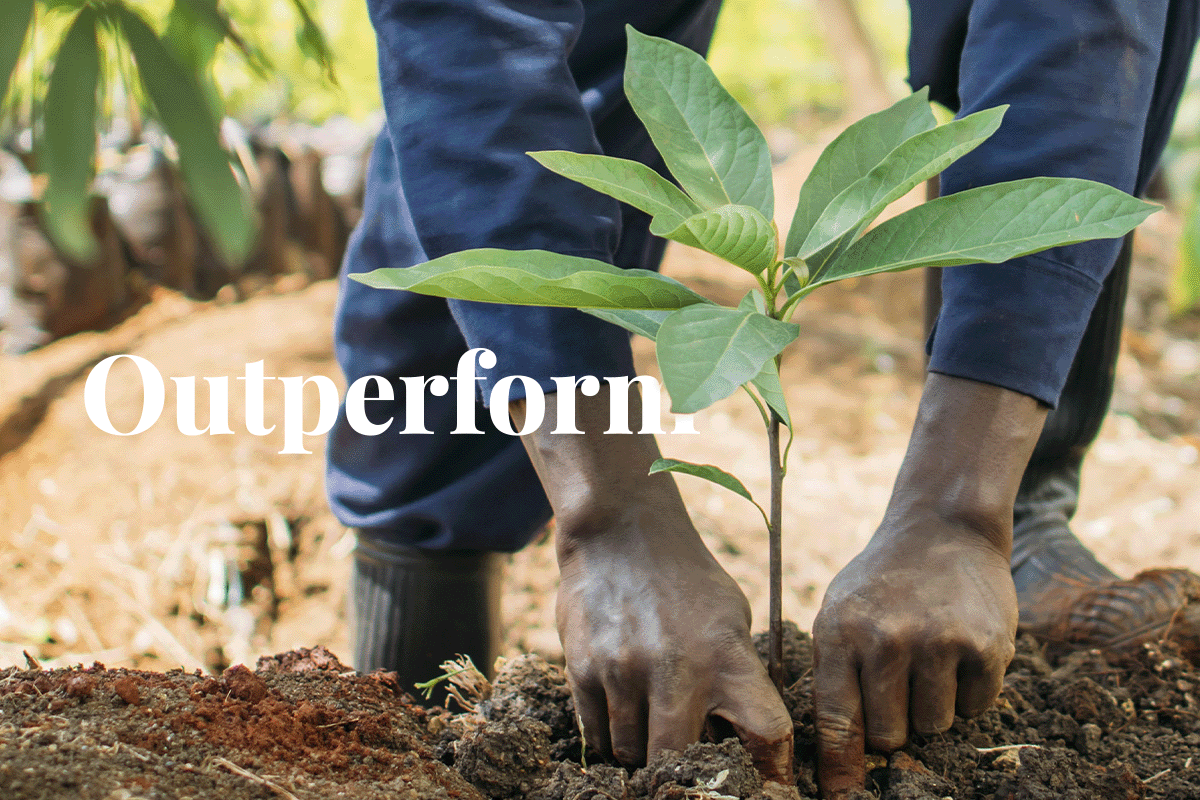Companies participating in the voluntary carbon market (VCM) are increasingly being recognised as leaders in the global effort to conserve nature. A recently published study by Forest Trends' Ecosystem Marketplace sheds light on how these companies are outperforming their peers who do not purchase carbon credits. The study reveals their achievements across various measures of robust environmental action, accountability, and ambition.
 Close up of a local man planting a tree seedling - Hongera Reforestation Project, DGB.
Close up of a local man planting a tree seedling - Hongera Reforestation Project, DGB.
One standout finding from the research indicates that businesses engaging in the VCM are achieving faster emissions reduction. They are 1.8 times more likely to demonstrate a commitment to decarbonising year-on-year, showcasing their dedication to reducing harmful emissions.
Another noteworthy aspect of companies participating in the VCM is their supplier engagement strategies. These companies are 1.3 times more likely to actively collaborate with their suppliers, employees, and customers to address impacts on nature. This points towards their holistic approach to controlling the effect their businesses have on the natural environment.
The median voluntary credit buyer stands out by investing three times more in emission reduction efforts within their value chain. This includes substantial investments in renewable energy consumption and the purchase of Renewable Energy Certificates (RECs), indicating their proactive stance in contributing to emissions reduction.
Read more: How to stay ahead of the curve on sustainability
These forward-thinking companies are also setting the bar high with their nature-positive targets. They are 3.4 times more likely to have science-based targets, reflecting their commitment to aligning their goals with the latest scientific knowledge. Furthermore, they are 1.2 times more likely to have board oversight for their eco-friendly transition plans, ensuring transparency and accountability. Most impressively, they are three times more likely to incorporate Scope 3 emissions in their net-zero targets. This is significant because Scope 3 emissions constitute the majority (91%) of carbon buyers' emissions, and controlling them is a challenging task as they are generated by various entities in the value chain.
The study has also identified a rising demand for high-quality carbon credits. This trend suggests that companies are willing to invest more to ensure the integrity of supply-side carbon credits. In 2021, the VCM was valued at $2 billion, and industry experts expect it to grow at least five-fold, reaching between $10–$60 billion by 2030.
Read more: Biodiversity takes the spotlight in corporate ESG strategies
Although carbon credits represent only around 2% of companies' total emissions, it is noteworthy that companies investing in the VCM are taking credible and holistic steps towards addressing environmental concerns.
Prominent figures in the field, including María Mendiluce, CEO of the We Mean Business coalition, and Dr M Sanjayan, CEO of Conservation International, emphasise the importance of carbon credits in supporting nature flourish and call for widespread participation.
The study underscores that VCM engagement is not just a minor aspect of environmental protection strategies; it is a driving force behind ambitious nature targets and should be regarded as a transparent and integrated carbon strategy. It is high time to acknowledge and celebrate the leaders who embrace comprehensive environmental solutions with substantial financial backing.
Read more: Carbon pricing: global solutions for a global challenge
Companies investing in carbon credits are at the forefront of the road to net-zero emissions, setting an example for others to follow. Their dedication to reducing emissions, promoting sustainability, and driving environmental action makes them the driving force behind a more sustainable and resilient future for all.
At DGB Group, we collaborate with corporations and investors to facilitate their entry into the ever-expanding worldwide carbon market. We specialise in creating certified top-tier carbon credits generated by large-scale, nature-focused initiatives like reforestation, afforestation, and energy-efficient cookstove projects. We extend our offerings to a diverse range of entities, including both major enterprises and smaller businesses, governmental bodies, and individuals. Our mission is to enable companies to invest in nature and reach net zero. To embark on this eco-conscious journey, you can begin by assessing your carbon footprint or reaching out to our dedicated team for tailor-made solutions that suit your specific needs.
Invest in DGB’s top-quality carbon credits



